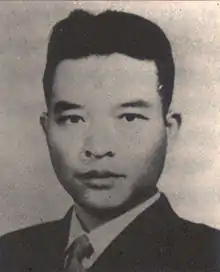Kim Won-bong
Kim Won-bong (Korean: 김원봉; 1898 – c.1958) was a Korean anarchist, Korean independence activist, communist, and later statesman for North Korea.
Kim Won-Bong | |
|---|---|
 | |
| Minister of State Control | |
| 1st Cabinet of North Korea | |
| In office 9 September 1948 – 8 May 1952 | |
| Premier | Kim Il Sung |
| Preceded by | Post established |
| Succeeded by | Choe Chang-ik |
| Personal details | |
| Born | c. 1898 Miryang, South Gyeongsang Province, Korean Empire (now Miryang, South Korea) |
| Died | c. 1958 North Korea |
| Political party | Workers' Party of Korea |
| Spouse(s) | Park Cha-jeong Choi Dong-Seon |
| Children | Kim Cheol-Geon Kim Joong-Geon Kim Hak-Bong |
| Occupation | Politician, military general |
| Military service | |
| Allegiance | |
| Branch/service | Korean Liberation Army |
| Years of service | 1941–1945 |
| Rank | General |
| Battles/wars | World War II |
| Korean name | |
| Hangul | |
| Hanja | |
| Revised Romanization | Kim Wonbong |
| McCune–Reischauer | Kim Wŏnpong |
| Art name | |
| Hangul | 약산 |
| Hanja | 若山 |
| Revised Romanization | Yaksan |
| McCune–Reischauer | Yaksan |
Biography
In February 1919, Kim entered the Shinheung Military Academy (신흥무관학교; 新興武官學校) and underwent military education for six months, after which he dropped out of the academy. On November 9 of the same year, Kim organized a Korean nationalist underground organization known as the Korean Heroic Corps (의열단; 義烈團), with Yang Gun-ho, Gwak Jae-ki, Han Bong-Geun, Kim Ok, and others. Among the Heroic Corps aims were the assassinations of Japanese officials and their collaborators, coupled with attacks on Japanese bases. After assuming the position of leader of the Heroic Corps,[1] Kim Won-Bong found that he could not accomplish the aims of the organization as it did not have a sufficient number of members. As a result, he joined the Whampoa Military Academy in 1926. Kim used the pseudonym "Choi Rim" and organized the Korean National Revolutionary Party, and the Joseon Communist Reconstruction Party.[2]
The Korean National Revolutionary Party was formed in Shanghai in 1935 by a group of left-wing nationalist Korean parties, organized by Kim Kyu-sik, Kim Won-Bong and Cho Soang.[3] On July 10, 1937, at the invitation of the Government of the Republic of China, Kim went to Lushan, the Chinese government's conference site and famed resort. During his time there, Chinese government officials insisted upon associating the united front against Japanese Imperialism. Before his return, Won-bong received extensive funding from the Chinese governor.[1]
Kim Won-Bong served as the deputy commander of the Korean Liberation Army (한국 광복군) of the Provisional Government of the Republic of Korea.[4]
Legacy
- Portrayed by Cho Seung-woo in the 2015 film Assassination.
- Portrayed by Yoo Ji-tae in the 2019 MBC TV series Different Dreams.
References
- "Kim Won-bong [김원봉 (金元鳳)]". Encyclopedia of Korean Culture. Retrieved July 21, 2023.
- [이우탁(Lee Woo-tak) (2006). 《김구, 장보고, 앙드레김(Kim Gu, Jang Bo-Go, André Kim)》.동아시아(East-Asia). 142p]
- Pratt, Keith L.; Rutt, Richard (1999), "Korean National Revolutionary Party", Korea: A Historical and Cultural Dictionary, Psychology Press, p. 236, ISBN 978-0-7007-0464-4, retrieved 2016-03-20
- Jo, Dong-geol (1995). 독립군의 길따라 대륙을 가다 [Following the Path of the Independence Army to the Continent] (in Korean). 지식산업사. p. 267.
Further reading
- Ha Shin Ae. "아나키스트의 눈과 탈식민적 국제 연대의 상상-박태원의 『약산과 의열단』 (1946)을 중심으로-". 동아시아문화연구 (in Korean). Vol. 76. OCLC 8024938818.
- Park Jin-hai (April 10, 2019). "Drama portrays life of freedom fighter". The Korea Times. Retrieved July 21, 2023.
- Park Tae-won (2015). Yaksan and Uiyeoldan [약산 과 의열단: 김 원봉 의 항일 투쟁 암살 보고서] (in Korean) (Kaejŏngp'an ed.). Sŏul T'ŭkpyŏlsi: 깊은 샘. ISBN 978-89-7416-242-9. OCLC 930395245.